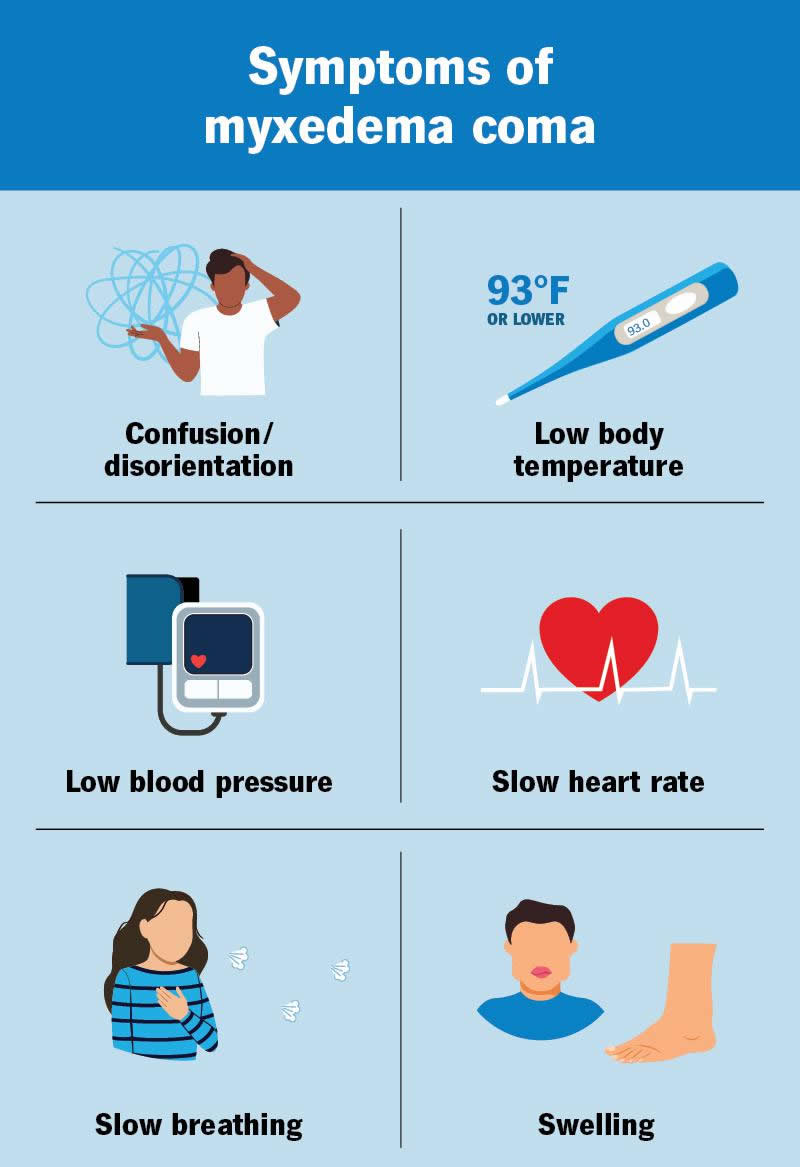Myxedema Coma
Myxedema coma is a rare, life-threatening complication of hypothyroidism. It happens when your body doesn’t produce enough thyroid hormones for several years. It can also happen when hypothyroidism isn’t well-managed. This leads to symptoms like slow heart rate, low blood pressure and confusion. It’s a medical emergency.
What Is a Myxedema Coma?
A myxedema coma is a serious complication of severe hypothyroidism. You can have symptoms like a slow heart rate, hypothermia and confusion due to your organs shutting down. It happens when you have extremely low thyroid hormone levels.
Despite the name, you may not go into a coma. This is why some healthcare providers call it a myxedema crisis. It’s a rare, but life-threatening condition.
Myxedema crisis needs immediate medical care in the intensive care unit (ICU). If a friend or loved one has hypothyroidism, watch for symptoms and call your emergency services number right away.
Symptoms and Causes

Symptoms of a myxedema coma
Some of the symptoms of this condition are:
- Confusion, disorientation or changes in mental status
- Coma or being unconscious
- Edema (swelling)
- Hypothermia (low body temperature)
- Low blood pressure
- Slow heart rate
- Slow breathing
Myxedema coma is a medical emergency. You can lose consciousness, and your organs may begin to shut down. Without quick treatment, it can lead to respiratory failure or death.
Myxedema coma causes
The most common cause is not receiving treatment for hypothyroidism — usually for a long period of time. This could be because you don’t know you have it or it’s not well-managed.
Severe hypothyroidism deprives your body of thyroid hormone. You need this hormone to run your metabolism, heart, muscles, brain — almost every body system you have. Without thyroid hormone, your body will start to shut down.
There are some known triggers of myxedema coma for people with hypothyroidism:
- Not taking, skipping or stopping thyroid medication
- Certain medications like lithium, amiodarone, sedatives and tranquilizers
- Cold temperatures
- Heart failure or stroke
- Infections like pneumonia
- Surgery
- Trauma
- Weakness or extreme fatigue
Risk factors
The biggest risk factor for a myxedema crisis is having a long history of untreated hypothyroidism. Other risk factors include:
If you’re receiving treatment for a thyroid condition, regular checkups with your provider are important. They help make sure your treatment is working.
Diagnosis and Tests
How doctors diagnose myxedema coma
Healthcare providers can diagnose it based on your symptoms, a physical exam and your health history. They may ask if you have a history of thyroid disorders, thyroid surgery or if you are taking thyroid medications. If you’re confused, it might be hard to share information. So, healthcare providers may have to diagnose you based on your symptoms and a physical exam.
Since it’s a medical emergency, you’ll most likely go to the ICU for immediate treatment. They’ll use blood tests to confirm low thyroid hormone levels.
Your provider may order other tests like:
- Arterial blood gas (ABG)
- Blood tests to check white blood cell count, low blood sugar and electrolytes
- EKG or ECG to check heart rhythm
- Lumbar puncture
- Any other tests your healthcare team feels are necessary
Management and Treatment
How is it treated?
Treatment for myxedema crisis typically takes place in an ICU where your healthcare team will monitor you closely. You’ll receive:
- IV Medications: Your provider will give you levothyroxine (T4) to quickly increase thyroid hormone levels. Sometimes, they also give you liothyronine (T3). You may receive hydrocortisone to help replace the hormones your adrenal glands aren’t making.
- IV fluids: IV fluids help stabilize your body. They can raise your blood pressure, replace lost electrolytes and treat dehydration.
- Supportive care: This could include things like a warm blanket for hypothermia, oxygen therapy or mechanical ventilation to help you breathe, or antibiotics to treat an underlying infection.
When should I see my healthcare provider?
Seek medical care right away if you believe your loved one is having a myxedema crisis. Symptoms could include confusion, swelling and shallow breathing.
If you have hypothyroidism, be sure to take your medication exactly as it’s prescribed. Attend all your appointments with your healthcare provider. They’ll run tests on your thyroid hormone levels to make sure you’re taking the right dose.
Outlook / Prognosis
What can I expect if I have a myxedema coma?
Myxedema coma is a serious condition that can turn fatal. Your healthcare team will need to recognize and treat it quickly. When this happens, the outcome is usually better. Even so, myxedema coma is fatal for about 2 to 6 out of 10 people.
Recovering from a myxedema coma can take days or weeks (depending on how severe your condition is). Be patient with yourself as you recover. Your body has gone through a lot. You’ll need to take thyroid medication for the rest of your life and have frequent checkups with your healthcare provider.
Prevention
Can I prevent a myxedema crisis?
The best way to prevent the condition is to get treatment for hypothyroidism. Visit your healthcare provider for checkups and take your thyroid medication as directed. This can prevent you from dangerously low thyroid hormone levels that can lead to myxedema crisis.
Telling your friends and family about the warning signs of myxedema coma is also a great prevention step to take. This can be beneficial if you become unconscious or have severe symptoms of the condition.
A note from Wockr
Myxedema coma is a scary complication of untreated hypothyroidism. Recognizing the signs and getting medical attention right away can make a huge difference. Taking medication for hypothyroidism and visiting your doctor regularly can prevent a myxedema coma. If you’ve survived a myxedema crisis, it’s normal to have lots of emotions and questions about what happened to you. Share these with your healthcare team so they can help support you.